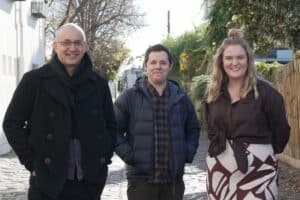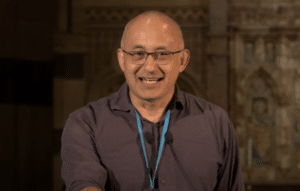
Rhys Bezzant
3 July 2024
Collin Hansen. Timothy Keller: His Spiritual and Intellectual Formation. HarperCollins Religious US, 2023.
God in Gotham? It wasn’t too long ago that the ideas of thriving Christian ministry and downtown New York City were poles apart. No new church had been built in Manhattan for 40 years, that is until 2012 when Redeemer Presbyterian Church opened a new building. Of course, several of its campuses scattered around the city still rent premises. Indeed, one of their plants meets in the auditorium of the New York Society for Ethical Culture, a 19th century atheist society which is happy to rent out their lecture theatre οn Sundays. But today in some circles, New York has become synonymous with refreshed ways of engaging post-Christian culture. If it is possible there, it is possible anywhere. The leadership provided by Tim Keller at Redeemer in NYC has been game changing.
In his recently published biography, Collin Hansen has written a magnificent survey not essentially of Keller’s life but of the intellectual and spiritual influences which profoundly shaped him. It was truly absorbing. We learn about his education, mentors, and capacious reading. These took a bookish undergraduate, who grew up in a legalistic Christian home, and made of him a leading apologist, evangelist, and pastor in the later 20th and early 21st century. To be honest, I was sceptical of the project to publish a biography not a year after Keller’s death from pancreatic cancer in 2023. But it succeeds brilliantly because of its modest aspirations. A journalist, Hansen’s prose was crisp, the chapter and section divisions roughly following Keller’s career were helpfully focused, and his conclusions judicious. A full-scale biography awaits.
Read more: Uniting two worlds: Australia’s latest Christian Book of the Year
Keller became a Christian and cut his teeth in student ministry with the Inter-Varsity Fellowship at Bucknell University in Pennsylvania during the late and turbulent 1960s. He trained for the ministry at Gordon-Conwell in Massachusetts, not long after the amalgamation of the two schools (incidentally led by former Ridley principal Stuart Barton Babbage). Perhaps surprisingly, he then took up a Presbyterian pastorate in a working-class town, Hopewell, Virginia, whose claim to fame was advertised on its road sign: “Welcome to Hopewell, chemical capital of the South.” His professorial style was successfully matched to a social demographic hungry to know the Scriptures. He learnt how to communicate in new ways. He was subsequently called to teach preaching at Westminster Seminary in Philadelphia, after which he took up the reigns of a church plant in Manhattan in 1989, and stayed there for the remainder of his ministry life. His impact in Australia has been significant, for the church-planting organisation City to City was his brainchild.
Hansen does well not just to name the thinkers who have influenced Keller, but also summarises their theological commitments and outlines the story of their intellectual transmission. Keller’s legalism was transformed by reading Luther on the nature of grace, and he read the Puritans voraciously to discover how they understood the dynamics of the spiritual life. One of his most significant theological interlocutors has been Jonathan Edwards, 18th century pastor in Massachusetts whose project was to present the Christian faith using the category of beauty and thereby to address the human head, and heart, and hands together. In our fragmented world, this vision of harmony has proved particularly useful in Keller’s engagement with culture.
After his wife Kathy introduced him to the writings of the Inklings, Keller lived in the worlds of Narnia and of the Rings. These fuelled his commitment to the imagination as a strategy to renew society, and to refresh the church’s engagement with the cities of this world around it. Indeed, Kathy had a correspondence with CS Lewis from when she was a young girl! Many lecturers impacted Keller, for example Ed Clowney, Elisabeth Elliot, Richard Lovelace, and RC Sproul. His early Arminian sentiments were replaced with more self-consciously Reformed commitments during his theological education. In later life, he became friends with sociologist James Davison Hunter at the University of Virginia, with whom he investigated how any social movement might make an impact in the late modern world. The answer: networks. Keller was good at this.
Read more: What we can learn from the American church
His theological style was irenic and coalition building. No wonder he helped found the Gospel Coalition. His extraordinary church-planting and church health manual, Center Church, amply demonstrates his spiritual and ecclesiological vision. He wanted to join doctrinal clarity, personal piety, and cultural engagement, which together would shape the church’s witness and outreach. His theoretical and practical approach to diaconal ministries, in Hopewell or in Manhattan, was a significant element in his missional thinking. Of course, Keller’s prodigious output in publications is matched by his homiletical legacy. He did not set out to be a megachurch pastor, but perhaps that is at the heart of his success. He glories in the gospel of Jesus Christ, which “provides a non-oppressive absolute truth, one that provides a norm outside of ourselves as the way to escape relativism and selfish individualism, yet one that cannot be used to oppress others” (p250). We need the insights Keller gleaned from his reflection.
The Reverend Canon Dr Rhys Bezzant is senior lecturer in Church History and dean of the Anglican Institute at Ridley College Melbourne.
For more faith news, follow The Melbourne Anglican on Facebook, Instagram, or subscribe to our weekly emails.






